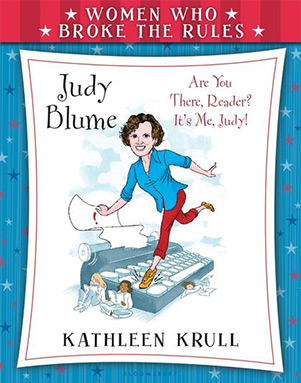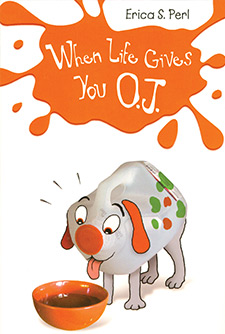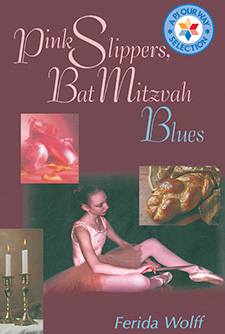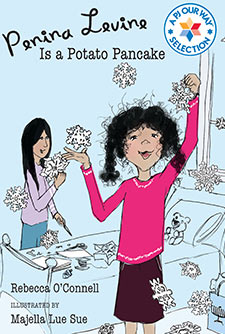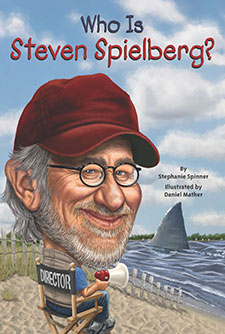Women Who Broke the Rules: Judy Blume
When the author of Are You There God? It’s Me, Margaret and the Fudge books first started writing, she was told she had no talent! Read how Judy Blume went from failure to 2,000 fan letters a month by writing about what kids’ lives are really like.
Average Rating
( hint: Login to leave a review! )
62 Reviews
Leave Review
What the Book is About
Jewish Content & Values
Positive Role Models
Content Advisory
Talk it Over!
More for You
What the Book is About
This is a short biography of the author of Are You There God? It’s Me, Margaret, Superfudge and many other popular books for tweens and young teens. The book shows how Judy’s childhood experiences influenced the topics she wrote about, and how the bestselling author overcame many obstacles in her determination to become a writer. The quotes from interviews with Judy and the color, cartoon-like illustrations help to make this book accessible, fun and informative.
Jewish Content & Values
- Although Judy’s family was not religious, they observed some traditions such as sitting shiva (the week-long period of mourning after the death of a close relative).
- As a child, Judy talked to God and prayed.
- The Jewish value of hatmadah is about not giving up in the face of obstacles and disappointments. Judy persevered in her quest to become a published writer despite many rejections and being told that she had no talent.
Positive Role Models
- Judy Blume: Judy followed her dream of becoming a writer and publisher rejections made her stronger and more determined to succeed.
- Once she was a popular author and her books began to be banned from libraries, she overcame her personal hurt feelings and began to speak out against censorship and in defense of free speech.
Content Advisory
Any book about Judy Blume must inevitably mention that her books deal with relationships, puberty and divorce, but although it explains that many people objected to the content of some of her books, and describes them as “edgy”, it doesn’t go into any detail about their controversial content.
Talk it Over!
When librarians and parents began demanding that Judy Blume’s books be banned, she started to think about changing scenes or wordings in the new books she was writing in order to make them less controversial, but in the end decided against making any changes. Why do you think she refused to compromise? If you were Judy, would you have made those changes so that you wouldn’t have to defend yourself from criticism?
More for You
Feminism and Jewish Women
When Judy Blume was a young mother, few women worked outside the home after marriage and many were frustrated by their limited opportunities. Historically, many women active in the feminist movement were Jewish: Betty Friedan’s 1963 book The Feminine Mystique was one of the earliest and most influential feminist books. Some Jewish feminists were active in promoting women’s rights in society in general, while others focused on women’s roles within Judaism. Some famous Jewish feminists are Gertrude Stein, Susan Sontag, Blu Greenberg, Ruth Bader Ginsburg, Naomi Wolf – and of course Judy Blume!
What the Book is About
What the Book is About
This is a short biography of the author of Are You There God? It’s Me, Margaret, Superfudge and many other popular books for tweens and young teens. The book shows how Judy’s childhood experiences influenced the topics she wrote about, and how the bestselling author overcame many obstacles in her determination to become a writer. The quotes from interviews with Judy and the color, cartoon-like illustrations help to make this book accessible, fun and informative.
Jewish Content & Values
Jewish Content & Values
- Although Judy’s family was not religious, they observed some traditions such as sitting shiva (the week-long period of mourning after the death of a close relative).
- As a child, Judy talked to God and prayed.
- The Jewish value of hatmadah is about not giving up in the face of obstacles and disappointments. Judy persevered in her quest to become a published writer despite many rejections and being told that she had no talent.
Positive Role Models
Positive Role Models
- Judy Blume: Judy followed her dream of becoming a writer and publisher rejections made her stronger and more determined to succeed.
- Once she was a popular author and her books began to be banned from libraries, she overcame her personal hurt feelings and began to speak out against censorship and in defense of free speech.
Content Advisory
Content Advisory
Any book about Judy Blume must inevitably mention that her books deal with relationships, puberty and divorce, but although it explains that many people objected to the content of some of her books, and describes them as “edgy”, it doesn’t go into any detail about their controversial content.
Talk it Over!
Talk it Over!
When librarians and parents began demanding that Judy Blume’s books be banned, she started to think about changing scenes or wordings in the new books she was writing in order to make them less controversial, but in the end decided against making any changes. Why do you think she refused to compromise? If you were Judy, would you have made those changes so that you wouldn’t have to defend yourself from criticism?
More for You
More for You
Feminism and Jewish Women
When Judy Blume was a young mother, few women worked outside the home after marriage and many were frustrated by their limited opportunities. Historically, many women active in the feminist movement were Jewish: Betty Friedan’s 1963 book The Feminine Mystique was one of the earliest and most influential feminist books. Some Jewish feminists were active in promoting women’s rights in society in general, while others focused on women’s roles within Judaism. Some famous Jewish feminists are Gertrude Stein, Susan Sontag, Blu Greenberg, Ruth Bader Ginsburg, Naomi Wolf – and of course Judy Blume!

